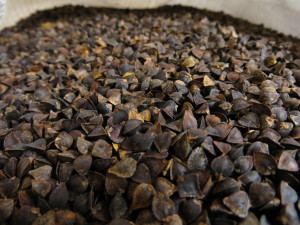
Buckwheat groats look like tiny, three-sided pyramids. After it’s ground, sifted, and baked into pancakes, buckwheat is both delicious and nutritious.
Buckwheat is native to Eurasia, specifically the region of Siberia. It is an ancient and hardy plant that can grow vigorously, even in poor soils and extreme climates. The plant’s fragrant white flowers are attractive to bee pollinators. Because of buckwheat’s hardiness and resistance to disease, it is one of the few commercially-grown grains that is not doused heavily with pesticides.
Buckwheat is nutritionally dense, containing all eight essential amino acids. It also contains a phytonutrient in the flavonoid family called “rutin,” which aids the cardiovascular system by helping to lower the levels of lipids in the blood.
Magnesium, also found in significant quantities in buckwheat, relaxes blood vessels and helps promote blood flow and nutrient delivery. This relaxation also lowers blood pressure, making buckwheat an ideal choice for overall cardiovascular health. Rutin and other flavonoids found in buckwheat also act as antioxidants in our bodies, and they help to extend the antioxidant capacities of vitamin C.
